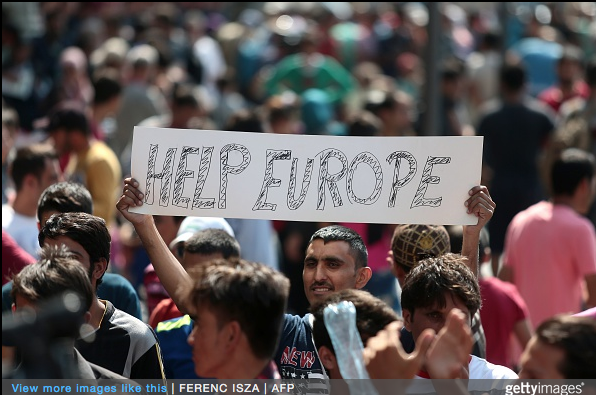President Obama’s plan to accept at least 10,000 war-weary Syrians desperate to resettle in the West because of a merciless civil war back home would endanger the lives of US citizens, Rep. Peter King (R-Seaford) said in a statement Thursday.
King, chairman of the Homeland Security Subcommittee on Counterintelligence and Terrorism, was swift in his objection to Obama’s plan, which comes as a divided Europe struggles to comes to grips with what has been described as the largest humanitarian crisis since World War II.
America, King said, is ill-equipped to properly scrutinize each individual that would enter the country in the 12-month time frame imposed by the administration. The outspoken congressmen also speculated that Middle Eastern refugees, who are mostly Muslim, could pose a threat, even invoking the Boston Marathon bombing.
“This decision is in direct contrast to opinion of leading law enforcement and intelligence officials in this Administration,” King said in a statement. “We do not have the capability to vet these individuals nor will we be able to develop it in the next twelve months. The Administration is moving forward full speed ahead without the necessary security backbone in place.”
“It is vital that we measure our humanitarian beliefs against the security risks of bringing more than 10,000 unknown individuals into the Homeland,” King continued. “I oppose this decision. We do not want another Boston Marathon Bombing.”
Far right groups in Europe have protested decisions by their respective countries to accept downtrodden refugees, mostly Syrians fleeing a war-torn country that has endured bombings by its own government and the threat of the so-called Islamic State (IS). Fear of IS using the crisis as a cover to infiltrate Europe reached such a fever pitch that people on social media are sharing photos of men who they claim to be militants. Specifically, a before-and-after photo of a man in military gear and holding a weapon next to another of him in a green t-shirt and sunglasses went viral after Internet users accused him of being a militant. He turned out to be a former member of the Free Syrian Army, according to a recent profile of the man published by the Associated Press. The BBC was the first to refute the claims posted on social media.
The divisive issue has Europe split. Germany is poised to welcome 800,000 refugees this year alone while Hungary’s prime minister is on record saying authorities will start arresting those crossing the border.
Many blame the West’s response, or lack thereof, to the Syrian civil war for the current crisis enveloping Europe. The number of Syrians displaced due to the conflict has reached 12 million, and half of those who have been uprooted are children, according to World Vision, a Christian humanitarian organization. The plight of the refugees has dominated news coverage in recent weeks, but the worlds conscience wasn’t truly shocked until raw photos emerged of a Syrian boy’s lifeless body on a beach in Turkey, leading to an outcry of support for the migrants.
The Syrian American Council, which claims to be the largest Syrian-American community organization in the US, plans to hold a “#LetThemIn” rally in Washington, DC Saturday and will call on international governments to accept more refugees.
During a press briefing on Friday, White House Press Secretary Josh Earnest said the US has already given relief agencies $4 billion to help those fleeing Syria en masse. He also noted that the “top concern” when deciding on how to adopt policy related to the crisis is “the safety and security” of the United States.
“I can tell you that refugees go through the most robust security process of anybody who’s contemplating travel to the United States,” he told reporters. “Refugees have to be screened by the National Counterterrorism Center, by the FBI Terrorist Screening Center. They go through databases that are maintained by DHS, the Department of Defense and the intelligence community. There is biographical and biometric information that is collected about these individuals. They have to submit to in-person interviews to discuss their case.”
That process typically takes 12 to 18 months,” Earnest said. Those wishing to come to the United States must apply through the United Nations.





























